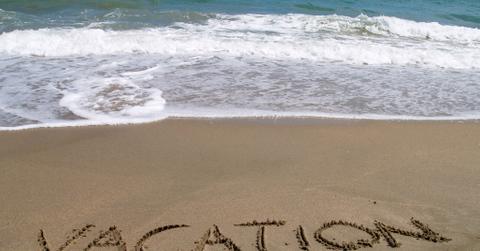How to Handle The Anxiety of Trying To Unplug From Work While on Vacation

When I offered to dial in to a meeting during my time off, my boss sharply stated: “It’s your vacation time. That means no working.”
In the back of my mind, I knew that she was right, but I also wanted my team’s feedback on the big project I had been working on. If that meant dialing in for an hour during my time off, then so be it.
But once my boss made that comment about not working during the holidays, I couldn’t help but think more on the topic: try as we might, can we stay away from work during our time off? Can we truly be 100 percent unplugged?
According to Dana Brownlee, founder and owner of Professionalism Matters, being 100 percent unplugged inhibits her from enjoying her time away. Instead, she embraces a 95 percent unplugged model, where she focuses on work for only five percent of the time.
Intrigued by her ideas and eager to learn more, Her Agenda interviewed Dana Brownlee. Here’s what she had to share:
Her Agenda: How did you come up with the 95 percent unplugged model?
Dana Brownlee: I came up with it the hard way, through my own personal experience. At first, I tried what I thought was the best thing. In my mind, I thought: “Play hard. Work Hard.” That meant when I work, I give 110 percent, and when I’m on vacation, I give that 110 percent. But then, what was happening to me was that I’d come back and have this avalanche of emails to go through, and then as an entrepreneur, what I started noticing was that there were one or two missed opportunities. Since being 100 percent unplugged was causing more anxiety, I decided to try something a little different: I made the decision to be 95 percent unplugged, and just that five percent made a huge difference.
Her Agenda: Can you give us an idea how this looks in practice?
Dana: Sure! For me, when I’m on vacation, I really want to be on vacation. But, from a communication perspective, I do want to allow for a small sliver of time where I am checking in. For me, it’s not every day. For a week long vacation, it might be every second or third day. I want to get across that for the vast majority of time, you’re doing what you want to do: focusing on you, having fun, and spending time with your family. But, it’s just allowing enough time so that you don’t get slammed in the face by this huge avalanche as a result of being completely disconnected. Let’s face it. The earth won’t stop spinning on its axis because you’re on vacation. Having a little bit of connection is helpful so that when you get back to work, you don’t feel like taking another break just to catch up.
Her Agenda: Do you have an example where you’ve regretted being 100 percent unplugged?
Dana: When I was having lunch with my family at the beach, I saw a call coming through. I knew it was a potential client, and I consciously didn’t answer it. But when I checked my voicemail a couple hours later and called the person back, they said, “We had some extra money to spend at the end of the year and we were just going to go with whoever answered the phone first.” It sounds crazy, but that’s literally what they said to me. For me, I’m an entrepreneur. I don’t have a ton of clients, so every new client opportunity is huge. Who knows how much revenue that could have turned into, over years? But on the flipside of it, because I’m self-employed, I have the liberty of knowing that my email and call load are not that significant. That call I just mentioned was a fluke – something like that doesn’t happen on a regular basis.
Her Agenda: We hear about work/life balance all the time. What do you think about this concept?
Dana: For better or worse, our society drives us to want more. We seem to focus more on what we don’t have and have an insatiable sense of want. The analogy I usually draw is going to an all-you-can-eat buffet. A lot of people approach the buffet with the mind that they’re just going to have everything. But in reality, do you really want to eat all 72 items on the menu? Or would you rather pick the 5 things that are really important and just sample and be satisfied with those? Instead of thinking, “I want to have it all,” why not be satisfied with plenty?
Her Agenda: What factors, in your opinion, affect us from being completely unplugged from work during our vacation time?
Dana: One major factor is peer pressure, some of it internally manufactured by our culture. That’s why I feel that leaders have a responsibility to be very intentional about the culture they develop and the message they send throughout their organizations. Another issue is technology. With technology, everyone is so reachable. Nowadays, there’s this expectation that you’re going to be working on an extended work cycle.
Her Agenda: How do we handle this expectation of an extended work cycle?
Dana: Each of us have to be clear on the boundaries that we want to set and ensure that we’re not sending mixed messages to our colleagues. People are not going to respect your boundaries if you yourself don’t respect them. For example, if you’ve communicated that you want to protect your weekend and vacation time, emailing during those times will send mixed messages to your coworkers! Instead, you could check your email, but when you respond, you might do a delayed send. This way, it appears that you sent it the day you got back to the office. Just remember to think it through and be strategic. With my five percent, I’m not scheduling meetings or planning to do any work. I’m just allowing enough of a sliver so that if things come up, I have that flexibility to respond and do what I need to do.
When I talk to women, here’s what I tell them all the time: You have to define what’s going to work for you, because your approach needs to match your life. 95 percent was something I was comfortable with. Maybe your number is 80 percent or even 100 percent, but for me, that just worked really well.
//






